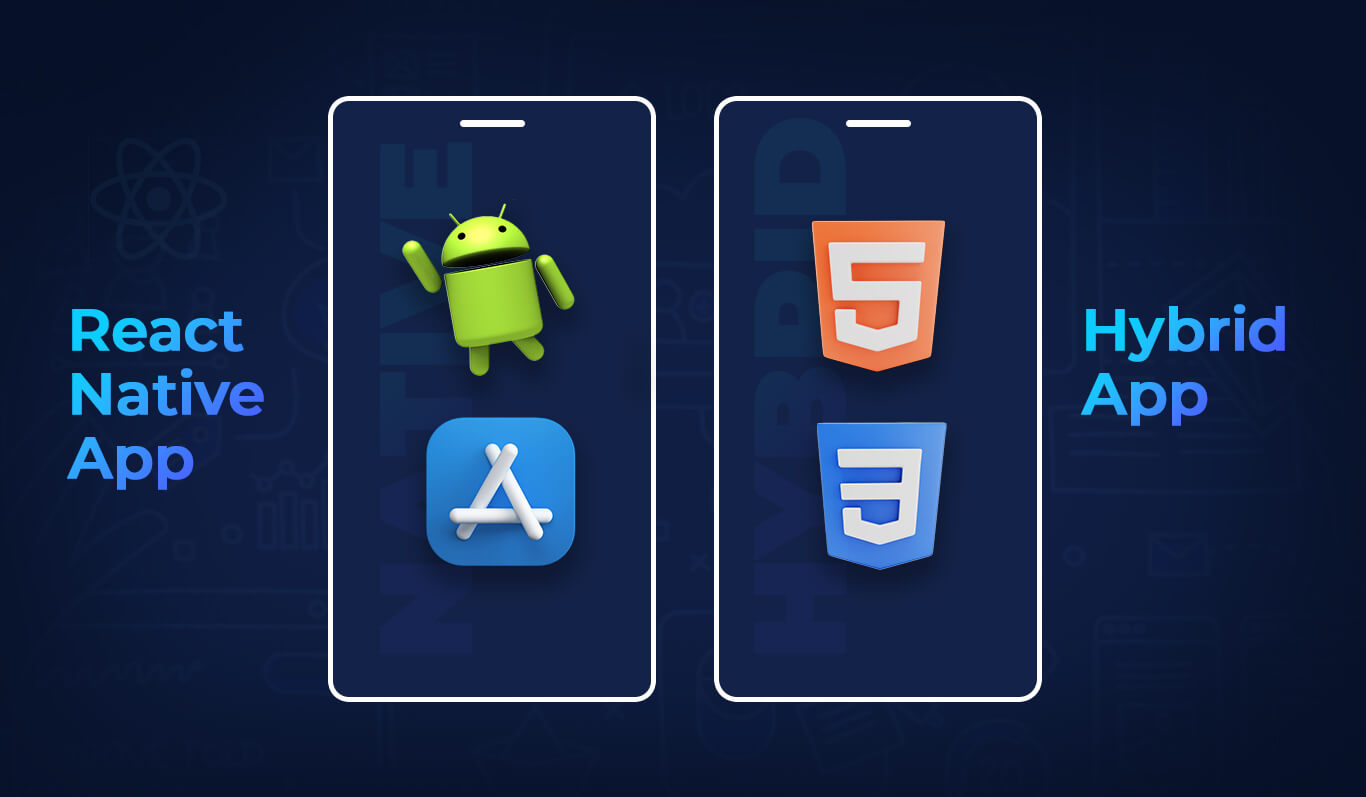React Native vs Hybrid App: Which is Better for Startups?

Every small gesture, action or inaction has increased priority when:
- You are starting out on a journey and any decision you make will change your future
- You don’t have much of a wiggle room to make mistakes because of financial restrictions
- You have to allocate resources based on priority due to there being limited resources
These are just some of the scenarios that a startup has to deal with. For a startup, to make a decision on any aspect of their business is a step that involves a lot of contemplation and analysis of the benefits and drawbacks that would result from it.
With a lot riding on every choice made, startups have a lot to lose or gain. One wrong choice can lead to loss of money, time, and may also ultimately lead to failure.
One of the most frequent problems that a startup encounters is the choice of the right technology for their product. If done right, this decision can help to gain a competitive advantage. It will help increase productivity, and profitability, build brand awareness, connect with prospective clients, save resources, and create a success story.
Yet, with so many rapidly evolving technologies available, how do you decide what is best for your business?
How To Choose the Right Technology for Startup App Development?
Assess business needs
Take time to analyze what your unique business needs are, what issue you're trying to solve, and how different technologies can help.
Identify your key capabilities
Assign various features and capabilities to your project, and group them into "necessary" and "desirable" capabilities. Prioritize the key capabilities that have features that will bring you the most value. Also, think about the features that are most likely to be used, and by the greatest number of users.
Perform a skills assessment
Is your team capable of working with the preferred technology? Will you need to hire a dedicated development team?
Hire an expert
Having this process outsourced will save you time and money. While reducing the resources needed, it still ensures that implementation, training, troubleshooting, and security are not compromised.
Consider current and future goals
Ensure your solution will align with corporate and IT strategies now and in the future by selecting a future-proof technology.
Smooth customer experience
Your technology should provide a better end-user/customer experience.
Competitor analysis
Identify your competitors and think about how your investment in technology will allow you to compete more effectively in the market.
Compare development costs
Analyze the cost of feasible solutions, including implementation, training, and support, to determine the overall cost of your project.
Now that we have understood how to choose the right technology, let's say we have zeroed in on the key capabilities to make our decision a tad easier. As time and money are limited to us, we focus on a technology that ensures faster time to market, efficient quality, and low development costs.
Compared to native apps, cross platform and hybrid apps fit the profile nicely. Both cross-platform and hybrid app technology enables market-ready solutions within a shorter time period at lesser costs.
Let us now compare React Native, a popular cross-platform technology, with Hybrid app technology.
React Native Vs. Hybrid App Technology
React Native is an open-source Javascript framework, that can be used to develop cross-platform applications for iOS, Android, Windows etc using a single codebase.
A hybrid app is an application that combines elements of both native apps and web applications. In essence, it is a web app inside a native app shell. Developers prefer hybrid apps because they allow them to write once for mobile apps but still support multiple platforms at the same time.
Benefits of using Hybrid app technology
Low cost of development
Hybrid apps provide cost-effective development. The developers can create a single code for both iOS and Android that can be used across multiple platforms.
Faster to market time
By writing and implementing a single unique code for both iOS and Android, it is easier to develop products faster.
Broader audience reach
Developing hybrid apps lets businesses reach a larger market by using both platforms at once.
Easy integration to the Cloud
Hybrid frameworks provide plugins such as Titanium, PhoneGap, Ionic that enable integrations to the cloud.
Issues Associated with Hybrid app development
Poor UX
Restricted animation, bugs, keyboard malfunctions, sluggish graphics, and its reliance on the open-source community result in a UX that is unappealing.
Weak performance
Hybrid applications add a layer between source code and the target platform, resulting in a long loading time and suboptimal performance.
Time consuming debugging
Because of the additional layer between the source code and the mobile platform, debugging takes a longer time.
Benefits of using React Native for startup app development?
React Native apps run smoothly with better performance
React Native framework works with the same platform components with which the native Android or iOS apps are written that enable it to perform at a higher speed.
The single codebase nature makes it time and cost-efficient
React Native development is designed on the ‘write once run anywhere’ characteristic. Thus, the developers of react native apps do not have to create separate code for each platform. With the single codebase, React Native helps to minimize the time and effort to develop native apps.
Supports third-party integration
With React Native, you get access to a rich open-source ecosystem for external integration. As a result, developers can integrate external systems to create custom user interfaces that attract end users.
Reusable native component
React native app builders create blocks with reusable native components that can be compiled directly to the native apps. Because React Native offers the same elements and components as iOS and Android, developers can create a native-like look, speed, feel, and functionality.
Offers third-party plugin compatibility
In React Native, third-party plugins allow users to make use of native device features like Bluetooth, GPS, and cameras. As a result, developers are more satisfied with the result since React native allows third-party plugins, and problems like slow loading times and higher memory usage are not an issue.
Faster development due to less coding requirement and testing effort
React Native allows mobile app developers to write code only once for both iOS and Android, thereby reducing the code line by half. Thus, the scope of erroneous codes and bugs is also minimized. This further reduces the testing efforts which ultimately results in a much faster development process.
Zero Rewriting
Using react native, you can embed native components directly into an operating system. This eliminates the need for developers to create codes from scratch to convert an existing mobile app to use React native.
Choose React Native for Startup App Development
Some of the successful startups that chose React Native services for app development are Discord, Facebook, Instagram, Uber Eats, and Pinterest. Each business is unique and the decision of which technology to use depends on the resources available.
From a startup’s perspective, React Native offers: Easy migration and upgradation of existing apps Develop an MVP fast Work within tight deadlines and budgets
We at Neetable help startups get noticed by providing efficient and cost-effective React Native services. Through our extensive experience as a React Native app development company, we help you develop high-quality cross-platform apps that deliver excellent engagement and conversions.
Interested in building a React Native App? Get in touch with us to get a free quote.
Frequently Asked Questions
1. What is the key difference between React Native and Hybrid apps?
React Native apps are not limited to web-based UI elements as Hybrid apps are. Hybrid apps are essentially web applications enclosed in a native shell.
2.What are the benefits of react native for startups?
Some of the benefits that React Native apps provide for startups are: Faster app development Lower development cost Native feel apps
3. How does React Native beat Hybrid apps?
React native offers optimum performance and quality which is not possible with Hybrid apps.
4. Why Hybrid app development is not the best choice for Startups?
- Low Performance
When it comes to performance, Hybrid apps are behind React Native. Hybrid apps add a layer between source code and the targeted platform, which hampers the overall performance of an app.
- Complex Debugging
The additional layer which Hybrid development creates makes the debugging process a bit difficult. It also creates a problem when developers do not have a proper understanding of the chosen platform.
- Difficult to Add New Features
One of the biggest drawbacks of the Hybrid app is how hard it is to introduce new features in it.
Request a Quote
Categories
Popular posts
Best Practices for Software Product Engineering Every CTO Should Implement
2023-14-18How to Build Your Own On-Demand Carpooling App Services?
2023-08-25How to Start an On-Demand Fuel Delivery Business: A Comprehensive Guide
2023-07-28Empowering Miners: How Fleet Management Apps are Transforming the Mining Industry?
2023-07-21A Complete Guide to Develop a Food Delivery App for Restaurants in 2023
2023-07-08Mobile Apps Transforming the Travel Industry: A Game-Changer in Travel Planning and Experience
2023-07-07
